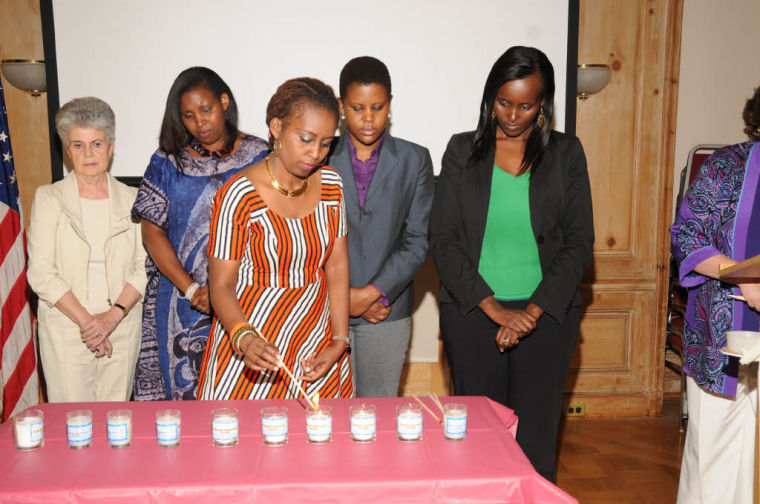
In a small room in Rwanda, the bodies of genocide victims lay preserved in the exact way they were slaughtered 20 years ago.
Jerry Sloane, the treasurer of the Holocaust Memorial and Tolerance Center of Nassau County, said that when he visited Rwanda in 2012 the “smell of death still permeated throughout the room.”
“There were women and children with their arms and legs cut off,” Sloane said.
Sloane’s speech was part of a presentation by the Holocaust Memorial and Tolerance Center of Nassau County to commemorate the 20th anniversary of the Rwandan genocide, in which a million Tutsi people were murdered in government-sanctioned killings by Hutu soldiers during the span of 100 days.
Center Chairman and Great Neck resident Steve Markowitz said the mission of the center, located at 100 Crescent Beach Road in Glen Cove, is to educate people of the atrocities of every genocide.
“[The Holocaust] was not the only genocide the world experienced,” Markowitz said. “We thought it was so appropriate to commemorate 20 years after the genocide.
Sloane said during his speech that his mission in visiting Rwanda was not to learn about the genocide, but to see “chimps and gorillas.”
But, he said, he could not escape the evidence of the genocide.
“I asked myself how could this have really happened?” Sloane said.
Sloane said he was taught the words “never again,” referring to the fact that the world would never allow a mass killing like the Holocaust to occur.
“But it is happening again,” he said.
Sloane said events such as the one on Sunday were “important for all of us to commemorate these crimes and never forget.”
Rwandan native Jeanne d’Arc Byaje, called her speech a “duty.”
“I think attending events like these is a duty we owe to our loved ones who were taken from us too soon and brutally,” Byaje said. “We remember a million souls slain in 100 days of horror.”
Although Byaje was not present during the killings, she said she was affected by the genocide as a native Rwandan.
“That story is our history,” she said. “It has to remain etched in our memory so that we don’t repeat it.”
Byaje said she could “still see bodies decaying in the streets” when she returned to Rwanda shortly after the genocide ended.
Jacqueline Murekatete said despite how far the country has come since the genocide, the period from April to July is still a “difficult time of the year for [Rwandans].”
Murekatete, a survivor of the genocide, said she struggled with sharing her story at first but was inspired to speak after hearing the story of Lillian and David Gewirtzman, members of the center and Holocaust survivors.
“This is a weapon of mass instruction,” Murekatete said of her story.
Murekatete was nine at the time of the killings, but she said she could “understand the injustice of what was happening.”
“We were being killed for something we had no choice over,” Murekatete said.
She said the killings were not the first instance of discrimination against members of the Tutsi tribe.
Murekatete said her parents had to hide from her Hutu neighbors several times before the 1994 killings took place. She said the Hutu majority government would broadcast messages over the radio, saying that Tutsi tribe members were “cockroaches.”
“We had a government that was invested in dividing the people,” he said.
Murekatete said she survived the killings by hiding with a family friend, who was a member of the Hutu tribe, and in an orphanage.
She now works as a human rights lawyer and has a law degree from Benjamin M. Cardozo Law School.
Murekatete’s speech was praised by Carl Wilkens, the only American to stay in Rwanda during the genocides.
“We are defined by what we do with what we have,” Wilkens said.
After the killings started, the U.S. government ordered all Americans in Rwanda to evacuate immediately.
But Wilkens resisted and stayed in the country to assist those in need, delivering medical supplies to refugees as well as offering them protection from Hutu soldiers.
“I would much rather have been there,” Wilkens said.
Wilkens said his speech on Sunday was the 314th presentation he gave on the Rwandan genocide since Aug. 31, 2013.
Wilkens joined survivors of the Holocaust and the Rwandan genocide in a candle lighting ceremony to remember the victims of all genocides throughout the world.






